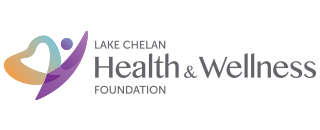By Dr. Tabetha Bradley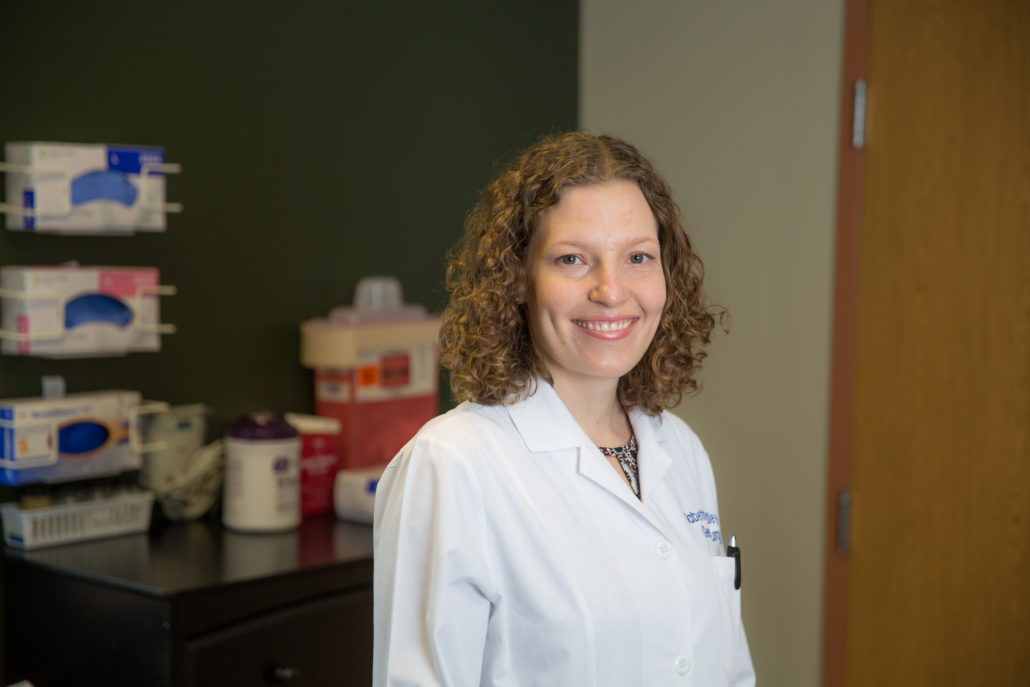
What does it take to become a surgeon? This is my story.
I was born in the Lake Chelan Community Hospital and grew up enjoying all that Chelan has to offer- swimming, skiing, camping, etc.
I loved growing up in Chelan, but by the time I was fifteen I was ready to get out of this small town and see the world. 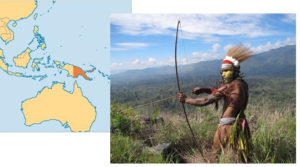
That summer, I flew with a group of teenagers to a small mountain village in Papua New Guinea. We flew onto a tiny airstrip in the mountains then hiked four hours through the jungle to a remote mountain village where tribesmen were still hunting with bows and arrows. For one month, we built a school and installed systems to catch rain water for drinking. We learned that the closest medical care was over a four-hour hike away, so serious injury or illness was often life-threatening. During that trip, I realized for the first time that there were people all over the world that didn’t have access to medical care, and I wanted to help.
So, I decided to become a doctor. I had no idea what I was getting into, which was probably a good thing! At the age of sixteen, I enthusiastically headed across the country to start college in South Carolina.
I gradually discovered that it takes many years of work, countless tests, and lots of money to become a doctor.
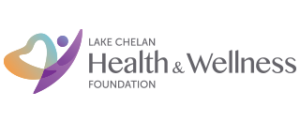
But, anything worth doing involves hard work. To help with expenses, I applied for scholarships and got several, including from the Lake Chelan Health & Wellness Foundation, which helped me pay for college and medical school.
After college, medical school was another four years of intense learning. The first two years were mostly classroom learning, followed by two years of clinical rotations and deciding which specialty to pursue. There were more specialties than I had ever imagined.
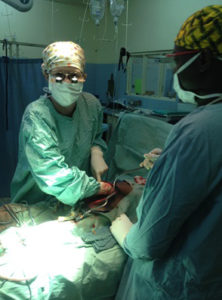
I enjoyed each rotation, but on my surgery rotation I learned that I loved to operate! As a medical student, I was thrilled the first time I got to operate…even when it was just to amputate a dead toe. In the end, I decided to become a surgeon because I loved it and couldn’t imagine doing anything else.
Training to be a surgeon is difficult. It takes at least five years of residency working about 80 hours each week, sometimes thirty hours in a row, with only a few days off each month.
But it is fascinating, challenging, and rewarding. I learned to operate on virtually every part of the body: to remove the appendix for appendicitis, take out colon/lung/breast cancers, remove gallbladders and fix blood vessels and hernias.
After five years of surgical residency in Virginia Mason in Seattle, I took my final exams to become a board-certified general surgeon.
After thirteen years of training, I was finally ready for my first job as a surgeon and I was ready to go back overseas – this time to Niger, West Africa.
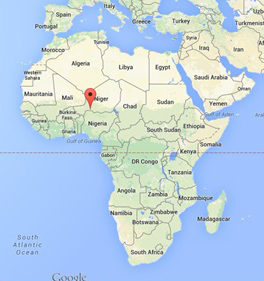
 In 2012, my husband and I traveled to the country of Niger where we lived on the edge of the Sahara Desert for two years.
In 2012, my husband and I traveled to the country of Niger where we lived on the edge of the Sahara Desert for two years.
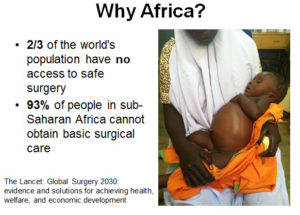
Niger is a country about twice the size of Texas located in western Africa. Over 80% of its land is covered by the Sahara Desert and the heat is often so intense that the rain vaporizes before it hits the ground.
People often ask, why go to another country when there is plenty of work in America?
It is true that we need more surgeons in America, but there are places in the world where people are dying every day from easily treatable diseases – like appendicitis or hernias – because there aren’t enough surgeons.
That doesn’t happen very often in the United States. In fact, two thirds of the world’s population have no access to safe surgery. Where I worked, in sub-Saharan Africa, 93% of people cannot obtain basic surgical care.
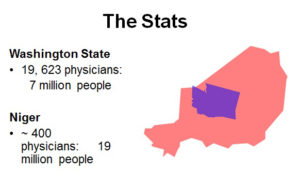
In Washington state, there are over 19, 000 physicians for 7 million people.
In the country of Niger, there are about 400 physicians for the 19 million inhabitants. Of these, only a handful are surgeons.
For comparison, there are more doctors in the city of Wenatchee than the whole country of Niger.
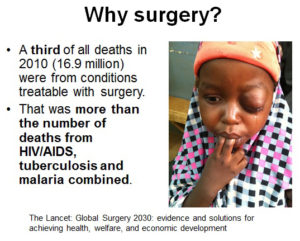
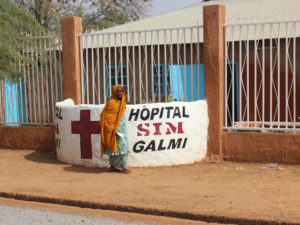
Many people think that the majority of health problems in developing countries are from infectious diseases like HIV, malaria, and tuberculosis.
In fact, the majority of money and energy goes into solving those problems.
What most people don’t know is that the need for surgery is just as great.
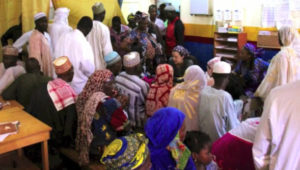
In fact, one third of the deaths in the world in 2010 were from conditions treatable by surgery which is more than from HIV, tuberculosis, and malaria combined.
Being a surgeon in Niger was extremely busy.
There were always more people to see and take care of than was possible. In two years, I operated on more patients that I had in all five years of my training in Seattle. To help with the shortage of surgeons, I also trained African surgical residents.
This is a typical patient I would see in clinic. She is an 11-year-old girl who had crampy abdominal pain for two weeks followed by severe pain for a couple of days.
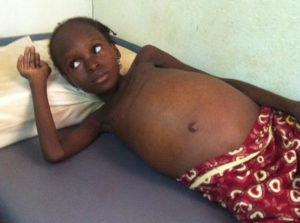
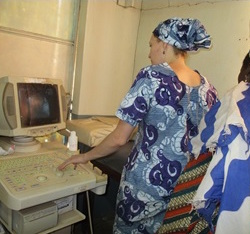
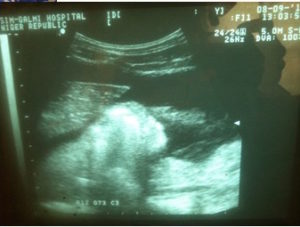
She traveled an entire day by taxi to come to our hospital. I had been in Niger long enough to know that she probably had an intestinal perforation caused by typhoid.
Typhoid is an infection that most often comes from drinking contaminated water. It is almost unheard of in the United States but happens frequently in Niger where clean water can be difficult to find.
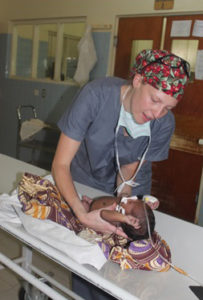
I was able to take her to the operating room, repair the holes in her intestine, and she went on to recover completely.
Being a surgeon is not boring! If you have a strong desire to help people, a love for learning, and don’t mind a little hard work, medicine can be an amazing profession.
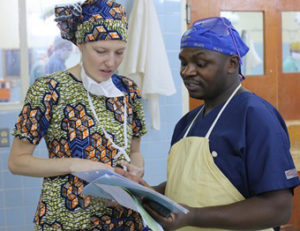
The last 19 years since I left Chelan to become a surgeon have been an amazing adventure that I wouldn’t trade for the world. But, as they say, there is no place like home and I am happy to be back in Chelan working at the hospital and raising my family in one of the best places in the world to live!
And Today…
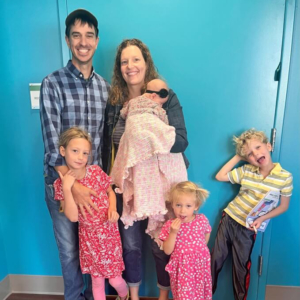
Pictured Left: Luke and Dr. Tabetha Bradley, with children Juliet, Eowyn, baby Hope, and Timber. Dr. Bradley is the General Surgeon at Lake Chelan Health.
We are proud to have invested in Dr. Tabetha Bradley’s healthcare education journey. Interested in a healthcare career? Or continuing your healthcare education? Chelan graduate/resident? Apply for your scholarship here!
